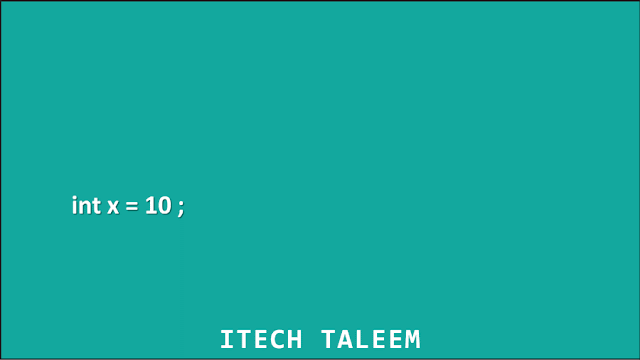C++ Arrays
Array is known as data structure statement.
Array use to store collection of same datatype data of fix size or user required size.We can say array is a collection of variables of same datatype.
same datatype means if we want to store rollNumbers of Students then we'll use integer( int ) data type because rollNumbers are integers numbers.
if we want to store name of students then we'll use string datatype to store names of different students because name is combination of characters or Alphabets.
if we want to store rollNumbers of 50 Students then we'll create 50 variables of int datatype.No this is not a good Programming practice.
for better performance we'll create an integer array having size of 50 to store rollnumbers of Students.
if we declare an array of student rollNumbers then each rollnumber of each student called element of array and every element or rollNumber is accessed by that specific index.
when we create an array it reserve memory locations of specified size. Array index start from 0 if you want to access value of first element from first memory location of an array then we use 0 index.
datatype myarray [ arraysize ] ;
it is known as one or single dimension array. in arraysize it must b and integer value greater than zero (0) and you can use any c++ supportable datatype.
for example if you want to add or create 50 element in an array called rollNumber of integer datatype you'll use following statement
datatype myarray [ arraysize ] ;
int rollNumber [ 50 ] ;
you'll use following statement for initialize array elements or values
Array use to store collection of same datatype data of fix size or user required size.We can say array is a collection of variables of same datatype.
same datatype means if we want to store rollNumbers of Students then we'll use integer( int ) data type because rollNumbers are integers numbers.
if we want to store name of students then we'll use string datatype to store names of different students because name is combination of characters or Alphabets.
if we want to store rollNumbers of 50 Students then we'll create 50 variables of int datatype.No this is not a good Programming practice.
for better performance we'll create an integer array having size of 50 to store rollnumbers of Students.
if we declare an array of student rollNumbers then each rollnumber of each student called element of array and every element or rollNumber is accessed by that specific index.
when we create an array it reserve memory locations of specified size. Array index start from 0 if you want to access value of first element from first memory location of an array then we use 0 index.
datatype myarray [ arraysize ] ;
it is known as one or single dimension array. in arraysize it must b and integer value greater than zero (0) and you can use any c++ supportable datatype.
for example if you want to add or create 50 element in an array called rollNumber of integer datatype you'll use following statement
datatype myarray [ arraysize ] ;
int rollNumber [ 50 ] ;
you'll use following statement for initialize array elements or values
int rollNumber [ 0 ] = 100 ;
int rollNumber [ 1 ] = 101 ;
int rollNumber [ 2 ] = 102 ;
int rollNumber [ 3 ] = 103 ;
int rollNumber [ 4 ] = 104 ;
or
Number of elements or values in { } can't be larger than the number of [ arraysize ]
int rollNumber [ 1 ] = 101 ;
int rollNumber [ 2 ] = 102 ;
int rollNumber [ 3 ] = 103 ;
int rollNumber [ 4 ] = 104 ;
or you can use following statement for adding values in one statement
int[5] rollNumber = { 100 , 101 , 102 , 103 , 104 } ;
or
int rollNumber [ 5 ] = { 100 , 101 , 102 , 103 , 104 } ;
Number of elements or values in { } can't be larger than the number of [ arraysize ]
or you can use following statement it'll execute without any error
int rollNumber [ ] = { 100 , 101 , 102 , 103 , 104 } ;
if you want to print 5th element or value you can access it by using 4th index in [ ] with array name because index of an array is start from 0.
rollNumber[4];
in c++ you can use this statement in cout to print the 5th element value like
cout<<rollNumber[4];
Example 1
Array
index
- #include <iostream>
- #include <string>
- using namespace std;
- int main( ){
- // Array declaration and initialization
- int myFirstArray[]={10,20,30,40,50,60,70};
- string myStringArray[]={"ITECH","Taleem"};
- cout <<"5th Value is :"<< myFirstArray[4] <<endl ;
- cout<<"String:"<<myStringArray[0] + myStringArray[1]<<endl;
- //value at 0 index
- cout<<"0 index value :"<<myFirstArray[0]<<endl;
- myFirstArray[0]=525; //update array value
- cout<<"0 index value updated:"<<myFirstArray[0] ;
- return 0;
- }
Console :
5th Value is : 50
String : ITechTaleem
0 index value : 10
0 index value updated: 525
Example 2
Printing All Array values
- #include <iostream>
- #include <string>
- using namespace std;
- int main( ){
- int myFirstArray[ ] = { 10,20,30,40,50,60,70 };
- for(int x = 0; x < 7 ; x++){
- cout<<"Value "<<myFirstArray[x]<<"at index "<<x<<endl;
- }
- return 0;
- }
Console :
Value 10 at index 0
Value 20 at index 1
Value 30 at index 2
Value 40 at index 3
Value 50 at index 4
Value 60 at index 5
Value 70 at index 6
Animated Gif of Array statement
Watch Video
C++ Arrays for Beginners Lecture in Urdu Hindi


Comments
Post a Comment